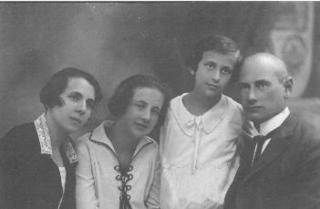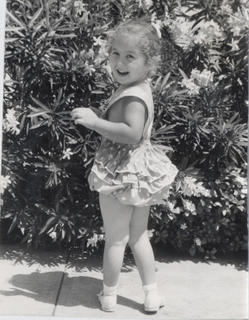Sunday, August 21, 2005
Six Feet Under - Ana Raab Marrero, 1913-1999
 Here is a picture of the Raab family in Arad, Romania, circa 1927: my grandmother Ilonka; my mother Panni; my aunt Agi; and my grandfather, Zoltan.
Here is a picture of the Raab family in Arad, Romania, circa 1927: my grandmother Ilonka; my mother Panni; my aunt Agi; and my grandfather, Zoltan.I just finished watching the Six Feet Under series finale. Alan Ball outdid himself at the end. I knew he would; I just didn't know how. In the retrospective right before the final episode, one of the writers made the comment that Ball never wanted to let any story line become too linear. Good for him, I thought.
Every time I watched SFU, I thought of my mother, Ana Raab Marrero. I always felt she'd like the show. Well, perhaps she wouldn't have fully appreciated either the language, or the graphic sexual scenes. She acted as if she were homophobic sometimes. And yet, Oscar Wilde was one of her favorite writers, as was Arthur Rimbaud. Go figure.
The show's inherently wacky realism, and its sometimes outrageous surrealism, would have grabbed her, I always felt. Plus the fact that the show depicted death as something normal that happens to everyone. As a doctor, she would have coolly, calmly agreed.
Yes: this was a show my mother and I could have sat through together, even if she complained half the time. She would have probably provided me with her own running commentary.
For that was Panni Raab Marrero. A woman of few words (except with and about me). In a weird kind of way, Ruth Fisher reminded me of her.
Ironically, I'm getting ready to tackle a project where I have to produce eighteen biographies between 200 and 500 words each. It struck me yesterday: why not write my mother's bio as practice? 500 words? Yes. Ana R. Marrero, and Oscar Wilde: less is more. Here you are:
ANA RAAB MARRERO, 1913-1999
When Ana Raab was a child growing up in the Carpathian Mountains of Transylvania, she never dreamt that she would find her calling on an island ninety miles to the south of a country on the other side of the Atlantic Ocean.
In medical school in Paris during the 1930’s, she met her future husband, Federico Efrain Marrero. She presented her thesis on “Nietzsche and Psychiatry” one week before the Nazis occupied Paris.
Ana fled south. In late 1940, Efrain joined her. They married on New Year’s Eve. In 1941 she arrived on Cuban soil, a refugee for the second time in her life.
Ana quickly adapted to her new home. In the process of learning Spanish, she wryly noted that she forgot her Romanian. She spent a considerable amount of time with her in-laws in the countryside, while Efrain was in school in Havana.
She bonded with her father-in-law, a reclusive, intense man who believed in the spirit world. “I listened to him, because no one else would,” Ana used to say.
In a manner of speaking, he became her first patient.
By the time Castro arrived in Havana in 1958, Ana sensed an all-too-familiar scenario. It was only a matter of time before she’d once again become a refugee.
She didn’t have to wait long. At the end of October, 1960, Ana, Efrain, and their daughter, Georgina, arrived in Miami. Efrain immediately began to reestablish himself as a doctor. Ana, however, had been a housewife for almost twenty years.
Shortly after moving to Milledgeville, Georgia in 1964, Ana made a major decision: she would return to medicine. In rapid succession, she passed the qualifying exam for foreign-born doctors; and served as assistant staff physician between 1965 and 1967 at Central State Hospital.
In 1967, she became a resident in psychiatry. She was almost fifty-four years old. In 1970, she returned to Miami, and helped Efrain in his medical practice for two years. A neighbor’s cousin was practicing as a psychiatrist at South Florida State Hospital. With Carmen Salazar’s help, Ana obtained a post there in 1972.
She worked at South Florida State Hospital as a clinical psychiatrist until she turned seventy, in 1983. Beloved by her patients, both young and old; by doctors, nurses, and orderlies, she was presented with a plaque and a Waterford vase when she retired.
The plaque read: “To Our Dear Dr. Ana Marrero, For Your Many Years of Dedication and Loving Care to Patients and Staff at S.F.S.H., From Your Colleagues, Friends and Staff, January 1983.”
As a three-time refugee, Ana considered herself “a citizen of the world.” Into her mid-eighties, she remained au courant about the world around her, belonging, as she did, to the progressive generation that had lived through two World Wars.
Ana was beginning to rediscover her Hebraic roots toward the end of her life. However, she insisted on being cremated.
Her daughter, Georgina, scattered her ashes on the very same Atlantic Ocean Ana had never dreamt she’d cross.
500 words
Inherently wacky, not inherent wacky.
I was half-asleep. Sorry.
Ninina in editor mode, here.
<< Home

